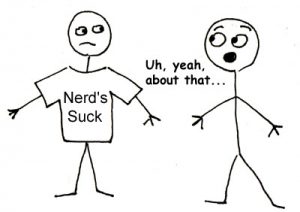
It’s not bad enough we have to learn grammar; we also have to unlearn it.
Grammar is as subject to fashion as everything else. After all, it’s just a set of somewhat arbitrary rules about which word goes where based on centuries of contradicting data and opinions. While the changes in grammar keep the publishers of textbooks and style manuals in business, the rest of us are left with the irritation of having to check periodically whether the rules we learned in fifth grade still apply.
Bear in mind, I’m not talking here about common use, by which I mean the way we tend to say things that are wrong but don’t care. If you want to impress with your writing, being a big old grammar slob like everyone else isn’t the way to go. The word “data” is the plural of “datum,” and so you should say “the data are,” whether the slouch in the cubicle next to you does or not. “Between” is used very differently from “among” (notice that’s not “differently than”), and it’s “most important,” not “most importantly.”
Get a free sample proofread and edit for your document.
Two professional proofreaders will proofread and edit your document.
No, I’m talking about actual changes in grammar rules, things we were told not to do that are now actually fine, or at least wrong to call wrong.
So to keep you up to date, here are five grammar rules that rule no more.
Starting Sentences with Conjunctions
This one fell to the power of shorter sentences. Used to be, people loved sentences that just went on forever (think Victor Hugo, James Joyce, and Henry James). Now we like our sentences fun-sized, but conjunctions (and, but, or, nor, so) are important for showing us how thoughts relate to each other. So what used to be wrong (such as beginning a sentence with “so”) is now just fine, as long as what follows the conjunction is a complete sentence.
Plural of Acronyms with ’S
A lot of old grammar rules deal with the confusion surrounding proper use of apostrophes, and in figuring all that out, this rule changed. To understand it best, it’s helpful to reference a similar rule that may have influenced things.
There are several homophones that are spelled both with and without apostrophes and thus change meaning accordingly. You know them well:
To deal with the potential confusion, the rule is simple: the apostrophe goes to the contraction.
So to deal with another head-scratcher, the old rule that making a plural of an acronym with an apostrophe s, and thus potentially making it look like a possessive, has been changed to just using a simple s.
Split Infinitives
Ah, “to boldly go” used to be my favorite error, but now Captain Kirk need not hang his head in grammar shame. It’s fine, as are “to automatically assume” and “to bravely ask.” However, it’s still a good idea to remember that “to go” and “to assume” only make sense in their connection to each other, so sometimes a split infinitive can make for a lousy sentence, such as, “We here at the company want to confidently, assuredly, and successfully provide solutions for our customers.” (Blech.)
Ending Sentences with Prepositions
 The loss of this one took away my favorite grammar joke. (Hey, I keep telling you people I’m a huge nerd.) But like the conjunction rule, it’s fallen victim to shorter sentence construction.
The loss of this one took away my favorite grammar joke. (Hey, I keep telling you people I’m a huge nerd.) But like the conjunction rule, it’s fallen victim to shorter sentence construction.
Adding the “to which” and “in which manner” and so on that can be needed to avoid ending a sentence with a preposition can just make the whole thing too long and tortuous to deal with. (Note: that would be “can just make the whole thing something with which it is too long and tortuous to deal,” and who wants to wade through all that?)
As with split infinitives, however, it’s good to remember that sometimes ending with a proposition can make for a crummy sentence. If something reads poorly, you might check to see if that’s the problem. I dislike, “What is this box supposed to go on?”
, Too
This rule just went away because it doesn’t add anything and because we currently don’t enjoy having commas all over the place. There is simply nothing gained from saying, “This is what I want, too,” as opposed to the (now correct), “This is what I want too.”
Now, while some of us might mourn the loss of hard-learned grammar rules, we can see in each case that the changes have been for the better, at least in terms of clarity and simplicity. Grammar rules are supposed to suit our needs, after all, not the needs of old dead people. Personally, I’d like us to resolve that whole she/he/they problem next.*
Julia H.
* And hooray! They did!
Get a free sample proofread and edit for your document.
Two professional proofreaders will proofread and edit your document.
Get a free sample proofread and edit for your document.
Two professional proofreaders will proofread and edit your document.
We will get your free sample back in three to six hours!